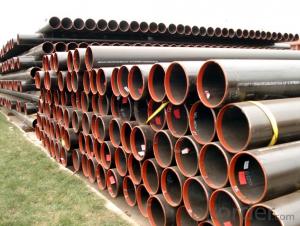Welded Crbon Steel Pipe BS1387, ASTM A53
- Loading Port:
- Tianjin
- Payment Terms:
- TT OR LC
- Min Order Qty:
- 25 m.t.
- Supply Capability:
- 10000 m.t./month
OKorder Service Pledge
OKorder Financial Service
You Might Also Like
1、Structure of Welded Crbon Steel Pipe BS1387, ASTM A53:
Welded Steel Pipe is to be used for conveying gas, water, and petroleum foroil and natural gas industries. And used for structural steel pies purpose.
2、Main Features of the Welded Crbon Steel Pipe BS1387, ASTM A53:
• High manufacturing accuracy
• High strength
• Small inertia resistance
• Strong heat dissipation ability
• Good visual effect
• Reasonable price
3、Welded Crbon Steel Pipe BS1387, ASTM A53Specification:
Standard | GB, DIN, ASTM ASTM A106-2006, ASTM A53-2007 |
Grade | 10#-45#, 16Mn 10#, 20#, 45#, 16Mn |
Thickness | 8 - 33 mm |
Section Shape | Round |
Outer Diameter | 133 - 219 mm |
Place of Origin | Shandong, China (Mainland) |
Secondary Or Not | Non-secondary |
Application | Hydraulic Pipe |
Technique | Cold Drawn |
Certification | API |
Surface Treatment | factory state or painted black |
Special Pipe | API Pipe |
Alloy Or Not | Non-alloy |
Length | 5-12M |
Outer Diameter | 21.3-610mm |
Grade | 20#, 45#, Q345, API J55, API K55, API L80, API N80, API P110, A53B |
Standard | ASME, ASTM |
1) Material:20#(ASTM A 106/A53 GRB.API5LGRB,GB),45#,16Mn,10#.
2) Specification range:OD:21.3-610mm,WT:6-70mm,length:6-12m or according to the requirement of clients.
3) Excutive standards:GB,ASME API5L.ASTM A 106/A53,Despite of the above standards,we can also supply seamless steel pipe with standard of DIN,JIS,and so on,and also develop new products according to the requirements of our clients!
4) Surface:black lacquered,varnish coating or galvanized.
5) Ends:Beveled or square cut,plastic capped,painted.
6) Packing:bundles wrapped with strong steel strip,seaworthy packing.
4、Packaging & Delivery
Packaging Details: | seaworthy package,bundles wrapped with strong steel strip |
Delivery Detail: | 15-30days after received 30%TT |
5、FAQ of Welded Crbon Steel Pipe BS1387, ASTM A53:
①How is the quality of your products?
Our products are manufactured strictly according to national and internaional standard, and we take a test
on every pipe before delivered out. If you want see our quality certifications and all kinds of testing report, please just ask us for it.
Guaranteed: If products’ quality don’t accord to discription as we give or the promise before you place order, we promise 100% refund.
②How about price?
Yes, we are factory and be able to give you lowest price below market one, and we have a policy that “ for saving time and absolutely honest business attitude, we quote as lowest as possible for any customer, and discount can be given according to quantity”,if you like bargain and factory price is not low enough as you think, just don’t waste your time.Please trust the quotation we would give you, it is professional one.
③Why should you chose us?
Chose happens because of quality, then price, We can give you both.Additionally, we can also offer professional products inquiry, products knowledge train(for agents), smooth goods delivery, exellent customer solution proposals.Our service formula: good quality+good price+good service=customer’s trust
SGS test is available, customer inspection before shipping is welcome, third party inspection is no problem.
6、Welded Crbon Steel Pipe BS1387, ASTM A53 Images:

- Q: Can steel pipes be used for swimming pool installations?
- Indeed, swimming pool installations can make use of steel pipes. Renowned for their robustness and power, steel pipes emerge as an apt alternative for both subterranean and aboveground swimming pool plumbing systems. These pipes possess the capacity to endure elevated water pressure and resist the deteriorating impact of pool chemicals. Moreover, steel pipes exhibit resilience against harsh weather conditions and can be effortlessly installed and maintained. Nevertheless, it remains crucial to guarantee appropriate treatment and coating of the steel pipes to avert rust and corrosion.
- Q: What are the different types of steel pipe bends for pipeline routing?
- There are several types of steel pipe bends commonly used for pipeline routing, including 90-degree bends, 45-degree bends, and 180-degree bends. Additionally, there are long radius bends and short radius bends, which refer to the curvature of the bend. These different types of bends allow for flexibility in pipeline design and routing to accommodate various installation requirements and project constraints.
- Q: How are steel pipes used in the manufacturing of offshore wind turbines?
- Steel pipes are used in the manufacturing of offshore wind turbines for various purposes such as supporting the turbine structure, housing electrical cables, and transporting fluids like hydraulic oil and cooling water. These pipes provide structural strength, corrosion resistance, and durability, ensuring the stability and functionality of the turbines in the harsh offshore environment.
- Q: Can steel pipes be insulated for thermal efficiency?
- Yes, steel pipes can be insulated for thermal efficiency. Insulating steel pipes helps to reduce heat loss or gain, ensuring better energy efficiency and cost savings. The insulation material, such as foam or mineral wool, is typically wrapped around the pipe to create a barrier that minimizes heat transfer.
- Q: Are steel pipes suitable for wastewater treatment plants?
- Indeed, wastewater treatment plants find steel pipes to be a suitable option. Their exceptional strength and durability make them a prevalent choice in this field. The ability to endure high pressure and resist corrosion renders them highly suitable for transporting wastewater and various fluids within the challenging environments of treatment plants. Moreover, the ease of welding and joining steel pipes allows for flexibility in designing and installing the piping system. All in all, steel pipes prove to be a dependable and economical selection for wastewater treatment plants.
- Q: How are steel pipes used in firefighting systems?
- Steel pipes are used in firefighting systems as a crucial component for delivering water and extinguishing agents to the affected areas. They are used to transport pressurized water from the water source to the fire hydrants, sprinkler systems, and fire hoses. Steel pipes are preferred for their durability, strength, and resistance to heat and corrosion, making them ideal for handling high-pressure water flow during firefighting operations.
- Q: What are the different types of coatings applied to steel pipes?
- There are several types of coatings that can be applied to steel pipes, including epoxy, polyethylene, fusion bonded epoxy (FBE), and zinc coatings. These coatings provide protection against corrosion, abrasion, and chemical damage, ensuring the longevity and durability of the steel pipes in various applications.
- Q: Are steel pipes suitable for underground cable protection?
- Yes, steel pipes are suitable for underground cable protection. Steel pipes provide excellent durability and strength, making them ideal for protecting cables from external factors such as physical damage, moisture, and corrosion. They are able to withstand the weight of the soil and any potential pressure from above, ensuring the cables remain secure and protected. Additionally, steel pipes can be easily welded or connected to create a continuous and seamless conduit, further enhancing their effectiveness in underground cable protection.
- Q: How do you calculate the flow velocity in a steel pipe?
- In order to determine the flow velocity in a steel pipe, one must take into account the principles of fluid mechanics and apply relevant equations. The Bernoulli equation is the most commonly used equation for this purpose, as it establishes a relationship between the pressure, velocity, and elevation of a fluid. The first step is to ascertain the volumetric flow rate (Q) of the fluid that passes through the pipe. This can be achieved either by measuring the mass flow rate (m) or by directly measuring the volumetric flow rate using a flow meter. Once the volumetric flow rate is obtained, the flow velocity (V) can be calculated. To calculate the flow velocity (V), divide the volumetric flow rate (Q) by the cross-sectional area (A) of the pipe. The cross-sectional area of the pipe can be determined using the formula A = πr^2, where r represents the radius of the pipe. Hence, the formula to calculate the flow velocity (V) in a steel pipe is: V = Q / A It is important to note that this calculation assumes an ideal flow condition and does not take into account any frictional losses or other factors that could impact the flow. In real-world scenarios, it is crucial to consider additional factors such as pipe roughness, fluid viscosity, and pipe diameter to obtain a more accurate estimation of the flow velocity.
- Q: What is the load-bearing capacity of steel pipes?
- The load-bearing capacity of steel pipes is influenced by a range of factors, including diameter, wall thickness, and steel grade. In general, steel pipes exhibit excellent load-bearing capacity due to their inherent strength and durability. The determination of load-bearing capacity involves utilizing engineering calculations and testing techniques. These calculations take into account factors such as the applied load, pipe dimensions, and material properties of the steel. To accurately ascertain the load-bearing capacity of specific steel pipes for a particular application, it is crucial to refer to engineering standards, guidelines, and consult with a structural engineer.
Send your message to us
Welded Crbon Steel Pipe BS1387, ASTM A53
- Loading Port:
- Tianjin
- Payment Terms:
- TT OR LC
- Min Order Qty:
- 25 m.t.
- Supply Capability:
- 10000 m.t./month
OKorder Service Pledge
OKorder Financial Service
Similar products
Hot products
Hot Searches
Related keywords


